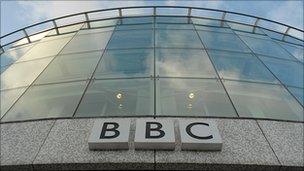MPs criticise BBC over delayed digital scheme
- Published

The IT project aims to allow staff to share content more easily and improve production efficiency
The BBC has been criticised by a Commons committee over a digital media scheme which was meant to save £17.9m, but ended up costing about £38.2m.
The public accounts committee said a £79m contract to deliver the Digital Media Initiative should not have been allowed without open competition.
And it queried the "ease" with which the BBC found savings of over £50m to cover the costs.
The broadcaster said the project would save money in the long run.
The Digital Media Initiative was aimed at transforming the way staff developed, used and shared video and audio material and was seen as an important part of a move of resources to Salford, the public accounts committee report said.
'No fault settlement'
It was meant to cost £81.m, but deliver benefits of £99.6m by March 2015.
Siemens - which had successfully completed a digital project at the BBC's Glasgow offices - was originally contracted to deliver it without open competition. But it did not deliver against "key contract milestones" and the contract was terminated as part of a "no fault settlement", the report said. It meant there was a two-year delay and £26m in lost benefits.
The committee said the broadcaster should have tested Siemens against other companies, but also criticised the fixed-price contract which transferred all the risk to Siemens.
"When things did not go to plan the BBC told us that the terms of the contract meant it was unable to intervene in the design and delivery of the system technology without the risk transferring back to the BBC," the report said.
The BBC told the committee it had felt under pressure to "procure through the Technology Framework Contract" with Siemens - but the public accounts committee - Parliament's spending watchdog - said it should always demonstrate why its contracts offered "better value for money".
Good progress
Members also questioned "the fact that the BBC easily identified new savings to compensate for the financial consequences of the contract failing" - amounting to £50.5m - £26m in "efficiencies" within BBC divisions and £24.5m of new efficiencies in the wider Siemens contract.
Committee chairman Margaret Hodge said: "We are concerned with the ease with which the BBC found over £50 million in savings to make up for the losses it suffered through late delivery of the project and its own increased delivery costs. This suggests the need for a more vigilant approach to value for money."
The report said that since the broadcaster brought the project back "in-house" it had made good progress and the technology was "on course" to be delivered by summer 2011 - although that was still five months later than planned - and to "deliver the technology required for the move to Salford".
However it said the financial case for the project had "weakened over time" - and ended up costing an estimated £133.6m.
However the BBC expects it to save money in the long run and told the committee it "aims to work in partnership with independent commercial companies and other public organisations to get as much value as possible out of its investment".
The BBC Trust, which approved the Digital Media Initiative, said it had set a "very clear and challenging efficiency target for the BBC as a whole" and had asked the National Audit Office to review progress made against the BBC's five-year efficiency programme.
A spokesman said the scheme was "a cutting-edge technology project which will carry long-term creative and financial benefits and transform the way we make content".
While the first bit of the project did not go according to plan, it was now progressing well, it said, and was already being used.
Many of the recommendations for effective oversight of contracts had already been implemented, he said, adding: "Importantly, costs arising from delays to the project have not been borne by the licence fee-payer."
The findings of the public accounts committee follows a report by the National Audit Office, external, published in February.